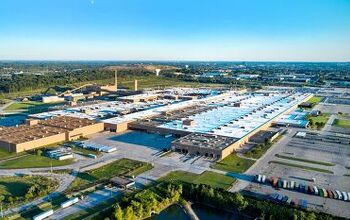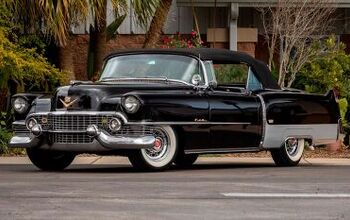FCA Fine Flying Solo, Equally Happy With Help

With Sergio Marchionne gone, most assumed Fiat Chrysler Automobiles would swiftly enact the late CEO’s plan to convince another automaker to partner with the company. Until recently, FCA was viewed as a dinosaur within the industry — limping along since its Fiat acquisition with a lineup of unpopular European imports and oversized American vehicles that couldn’t possibly endure tightening fuel regulations.
However, the reality turned out to be quite different. While Fiat’s volume in the U.S. fell from its 2014 peak of 46,121 units to just 15,521 deliveries in 2018, Dodge and Chrysler managed to endure their losses more gracefully, cutting less-profitable models from the lineup and focusing instead on larger vehicles requiring less pricey R&D. Meanwhile, Jeep rose like a phoenix from the ashes — with its annual volume going from 231,701 deliveries in 2009 to last year’s 973,227 units.
Now, FCA is investing in the United States while Jeep makes inroads across the globe. Things are going so well, in fact, that the company’s projected profits are expected grow in the second half of 2019 — even in an era of declining sales. CEO Mike Manley told Automotive News during the Geneva Motor Show that the company now possesses a balance sheet with “strength we haven’t had before.” But being confident in the automaker’s current business strategy doesn’t mean Manley isn’t interested in potential partnerships.
“I want to find areas where cooperation — whether it is partnerships, whether it’s joint ventures or whether it is deeper levels of equity cooperation that makes sense for us and whoever that is — [will] give better vehicles to our customers and a better return to our shareholders,” Manley elaborated. “I’m very open to it.”
While most of those earlier prospective deals have since dissolved, PSA Group is planning a revival in the United States and likely needs a domestic partner to make it happen. FCA is on the list, and it’s looking particularly appetizing after spinning off Magneti Marelli, committing to its restructuring plan (which doesn’t involve Ford or General Motors’ staffing cuts), adding production and jobs in North America, and getting its finances in better order.
However, Fiat Chrysler has yet to fully commit itself to the costly endeavor of developing electrified powertrains and autonomous vehicles. Marchionne previously said that automotive partnerships would help the industry shoulder the immense cost associated with mobility projects, and FCA was left without an arm focused on either. While the company has promised more plug-in hybrids soon, it’s often seen as being behind the curve in terms of electrification (and delivering competitive fuel economy averages across its product range). In truth, the company ranked dead last in the most recent assessment of corporate fuel efficiency averages.
But Manley says the public’s slow EV adoption rate hasn’t hurt the company — claiming that his default response to those asking if FCA is late in bringing electrification to the market is “late for what?”
That will undoubtedly change as government-mandated efficiency averages continue to climb in other parts of the world, but Fiat Chrysler still might be able to mitigate costs via a clever partnership. Manley said Volkswagen’s decision to open its EV project to the rest of the industry further proves that being late to the e-party isn’t necessarily a bad thing. “If the biggest car company in the world is saying, ‘Please come and partner on a platform,’ I don’t think I need to endorse the point that scale is important,” he said.
The company’s big mobility partnership currently involves little more than selling vehicles directly to Waymo to be adapted and used for autonomous testing and ride-hailing services. Last year, the tech firm announced it would purchase 62,000 Chrysler Pacifica minivans for its autonomous fleet, with FCA saying there was a possibility it could eventually gain a licensed self-driving system for use in its retail vehicles. While the second half of that equation is terribly uncertain, it does cast FCA in a different light from its competitors.
Rather than invest a sizable portion of its value into purchasing tech companies and developing its own self-driving system, FCA has decided to supply product (making some money in the process) to those that are in the hopes that they’ll come back around to return the favor. It’s a strategy that made the company look like a congregation of luddites a few years ago, but has begun to appear rather wise, especially as other automakers continue incurring significant financial losses through these types of investments with little to show for it.
[Image: FCA]

A staunch consumer advocate tracking industry trends and regulation. Before joining TTAC, Matt spent a decade working for marketing and research firms based in NYC. Clients included several of the world’s largest automakers, global tire brands, and aftermarket part suppliers. Dissatisfied with the corporate world and resentful of having to wear suits everyday, he pivoted to writing about cars. Since then, that man has become an ardent supporter of the right-to-repair movement, been interviewed on the auto industry by national radio broadcasts, driven more rental cars than anyone ever should, participated in amateur rallying events, and received the requisite minimum training as sanctioned by the SCCA. Handy with a wrench, Matt grew up surrounded by Detroit auto workers and managed to get a pizza delivery job before he was legally eligible. He later found himself driving box trucks through Manhattan, guaranteeing future sympathy for actual truckers. He continues to conduct research pertaining to the automotive sector as an independent contractor and has since moved back to his native Michigan, closer to where the cars are born. A contrarian, Matt claims to prefer understeer — stating that front and all-wheel drive vehicles cater best to his driving style.
More by Matt Posky
Latest Car Reviews
Read moreLatest Product Reviews
Read moreRecent Comments
- Ajla Maybe drag radials? 🤔
- FreedMike Apparently this car, which doesn't comply to U.S. regs, is in Nogales, Mexico. What could possibly go wrong with this transaction?
- El scotto Under NAFTA II or the USMCA basically the US and Canada do all the designing, planning, and high tech work and high skilled work. Mexico does all the medium-skilled work.Your favorite vehicle that has an Assembled in Mexico label may actually cross the border several times. High tech stuff is installed in the US, medium tech stuff gets done in Mexico, then the vehicle goes back across the border for more high tech stuff the back to Mexico for some nuts n bolts stuff.All of the vehicle manufacturers pass parts and vehicles between factories and countries. It's thought out, it's planned, it's coordinated and they all do it.Northern Mexico consists of a few big towns controlled by a few families. Those families already have deals with Texan and American companies that can truck their products back and forth over the border. The Chinese are the last to show up at the party. They're getting the worst land, the worst factories, and the worst employees. All the good stuff and people have been taken care of in the above paragraph.Lastly, the Chinese will have to make their parts in Mexico or the US or Canada. If not, they have to pay tariffs. High tariffs. It's all for one and one for all under the USMCA.Now evil El Scotto is thinking of the fusion of Chinese and Mexican cuisine and some darn good beer.
- FreedMike I care SO deeply!
- ClayT Listing is still up.Price has been updated too.1983 VW Rabbit pickup for sale Updated ad For Sale Message Seller [url=https://www.vwvortex.com/members/633147/] [/url] jellowsubmarine 0.00 star(s) (0.0) 0 reviews [h2]$19,000 USD Check price[/h2][list][*] [url=https://www.ebay.com/sch/i.html?_nkw=1983 VW Rabbit pickup for sale Updated ad] eBay [/url][/*][/list] Ceres, California Apr 4, 2024 (Edited Apr 7, 2024)

































Comments
Join the conversation
Another promo shot intended to depict snow prowess in not even 6" of snow. We are not impressed.
While showing some wise restraint in not throwing money at the EV/Autonomous driving tech of the week, with the lack of R&D investment in anything new for Chrysler and Dodge, I could easily see FCA dropping the aging lineups in the near future. This make good business sense since Ram and Jeep are the only money-making divisions in America but it will certainly upset the petrol-heads. And of course, they'll need to change the name to FJA